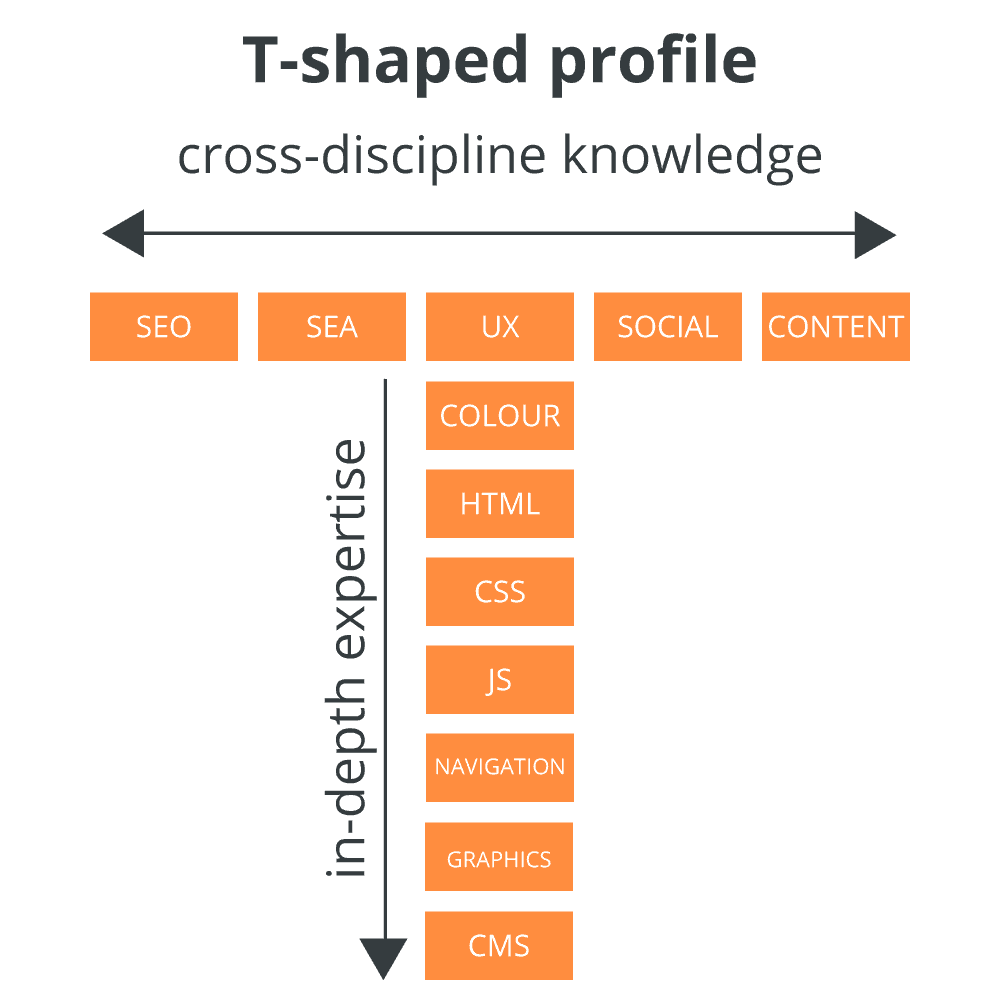The rise of the technical marketers
Why online marketers should learn web technologies to optimize UX
With SEO and SEA becoming ever more automated, the demand for technical marketers is on the rise. A decent understanding of web technologies like html, css and UI is no longer a luxury but will become a must pretty soon for anyone working in online advertising.
Regardless if you are working as an online marketer, SEO-specialist or online advertiser in a small agency or a large company with dozens or even hundreds of employees: you have certainly come across projects where you noticed that all the elements just didn’t add up. You did all you had to do regarding keyword research, branding and strategy only to find out that the website just wasn’t up to do the final step: making visitors convert. The opposite is equally possible if you happen to be a graphic designer or UI/UX-developer: you sat down with the client to agree on layout, color schemes, typography etc and you find out the online marketing team came up with a plan that somehow just didn’t match with the story you brought with the website or app you developed.
Online marketing agencies often seem to be allergic to everything that even comes close to technical matters and the same goes in the opposite direction for companies whose focus is development of websites and apps. I’ve noticed this many times during the years I’ve spent so far in this business. Even large online marketing agencies, who have a reputation to maintain, don’t hesitate to dispatch everything to freelancers or countries abroad that has to do with development and design. If their prospect asks about the possibilities for a new website, they quickly turn to a template website to download for a couple of dollars. If you’ve attended conferences or seminars on online marketing, you’ve heard a myriad of refined online strategies and ideas but not a word how they should be applied technically. I think this has a lot to do with the dogged picture we have of the people involved in any given online project. It all starts with the salesman, who has a lot of flair and dash making the sales pitch towards the prospect. As soon as the contract is signed, the online marketer – who is not supposed to contact clients directly – starts working on his strategy, content and copywriting and if there is a website or app to be developed, this task ends up with the developer – who hates contact with any humans whatsoever. Most of the time he or she is referred to as some kind of autistic zombie, unable to spell two words correctly, working after hours surviving on a diet of pizza and soda drinks. Often this a freelancer so the agency only has to make a call when they think they need him.
This is obviously an exaggerated mockery but you’d be amazed how vividly these ideas persist today with workmates, recruiters, human resources and mid-level / upper management. When I switched form being a full time developer to an online marketeer a couple of years ago, I had to explain to many people what on earth I was thinking, as if it was some kind of disgrace or demotion. On regular occasions I have to answer the question what I want to be a couple of years from now: a programmer or an online marketer?
This question baffles me. Because contrary to being pregnant, it is perfectly possible to be both. Indeed, I am convinced that the importance of technical knowledge for online marketers will grow in the near future if you want to keep an edge on your competitors. The title of this blogpost could also have been ‘The rise of marketing-minded developers’. The bottom line is you shouldn’t limit yourself to knowledge or expertise you have today. Expand it across domains.
The T-shaped marketer
The concept of the T-shaped marketer has been around for some time now. What it means is that you should have a broad knowledge of several skills (e.g.: commercial insights, copywriting, development, SEO, SEA, UX, Social,..) and that you excel in one or two of these domains.
Believe it or not: this model is becoming the standard instead of the exception. It is gaining popularity over the I-shaped marketer (who has a thorough in-depth knowledge in just one field) and generalists (who have basic knowledge of all disciplines but fall short when it comes down to expertise). Did you know Facebook only hires T-shaped people nowadays? It makes sense if you drill down to the benefits:
- Project teams with T-shaped people can be much smaller because the people involved understand each other much better. Details can be refined and elaborated by the corresponding persons who have in-depth knowledge of the specific topic (this is the bone of the T). This is contrary to a team of ‘I-shaped’ people who tend to throw the project to someone else’s desk as soon as an issue pops up they don’t fully understand.
- T-shaped people are more eager to learn. Know this: everything that happens online is man-made. It’s not some kind of spooky magic. If you take the time to get yourself acquainted with some web technologies, you will soon find out it is often easier than you think. It’s OK to say there is something you don’t know, but it’s vital you want to know.
- Projects where T-shaped people are involved are less time consuming and therefore cheaper, because they are less dependent on external resources. This refers to the first point in this list and to the situation I described at the beginning of this blogpost. The more people you need to complete a project, the more you have to give away control and hope everyone is willing to play ball. This is the point where things can seriously go wrong when deadlines are not met or when the final product doesn’t meet the client’s expectations. People start blaming each other instead of looking for a solution.
Online marketing is becoming ever more technical…
Is SEO-SEA-Social a marketing story or a user experience story? You know the answer: it’s both. If you have a refined online strategy or a well executed AdWords campaign, the return will be as good as… the experience on the website. This is nothing new (do not forget landing page experience is a factor for keyword quality in Google AdWords). But how obvious it may be: in practice this is seldom the case, again because the two parts are dispatched to different people who don’t speak each other’s language (sometimes even literally). The more people involved in a client’s project: the more difficult it is to keep the customer up to date. It makes smooth communication much harder too because your client won’t know who to speak to when he has a question. Nowadays, good SEO is about so much more than simply writing some meta titles and highlighting a few keywords.
… and people on the internet are becoming ever more critical
By now, the importance of a responsive website is all too clear. But let’s say you are an online marketer and your customer asks you to run a campaign specifically for mobile. You’d better know to pinpoint the bottlenecks on his mobile website so you can guarantee him the best possible ROI. If you take a look at Google Partners’ latest Mobile Sites Certification, it is clear that a thorough technical understanding is ever more in demand for online marketers. This is also to address the topic of overpromising. Many times SEO, SEA or social are still sold as some kind of miracle solution while in reality any given marketer knows it’s a never ending process. Think about the importance of speed optimization, especially on mobile devices. A good understanding of technologies like structured data, Accelerated Mobile Pages or Progressive Web Apps will soon be indispensable for any online marketer.
A task for recruiters, employers and employees
There is a paradigm in companies: what if we train our staff and they leave? Then all those efforts are wasted because he or she walks away to the competition with our knowledge. But what if you never train your staff and they stay? It would only be a matter of time before you’re playing catch-up. Employing T-shaped marketers is one thing but it is only useful if they stay T-shaped. This means everyone has to remain on top of their game: recruiters must identify the opportunities, employers have to offer relevant and up-to-date training and employees have to keep an eagerness to learn.
Conclusion: You have to develop a multidisciplinary set of skills. Be under no illusions: this is something that cannot be achieved overnight but in the long run you will be rewarded. And truth be told: with the dazzling speed that trends are changing in the online community, keeping up is often easier said than done. But I think that in the future the difference will be made through ever smaller details because product definitions are becoming more and more ‘me-too’ styled. Identifying a site’s or app’s strengths and weaknesses quickly is vital for online advertisers to implement upgrades and improvements as soon as possible, allowing them to keep developing as the competition progresses too. The merge between marketing and development is happening already and will only become more prominent. A wide variety of skills will allow you to pick up new knowledge much faster so you can offer your client a holistic product where the underlying elements reinforce each other. A complete online experience is only possible when all the elements aren’t stitched or patched to each other but work seamlessly in harmony.







